2η ΣΥΝΕΝΤΕΥΞΗ
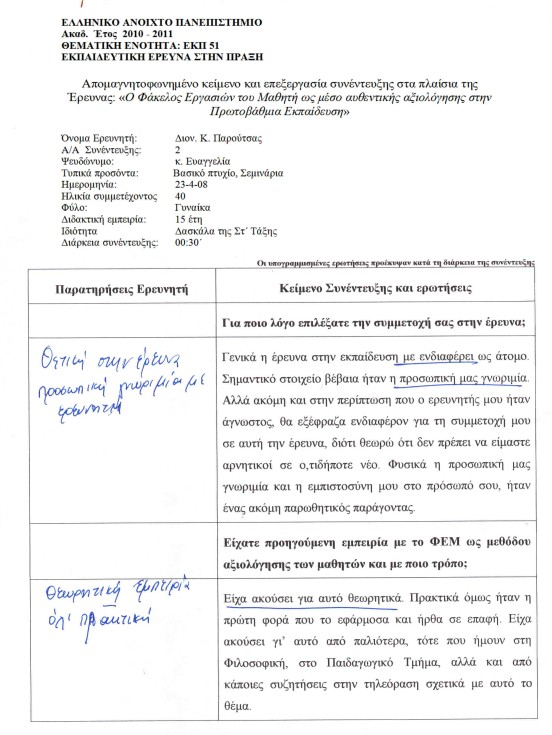
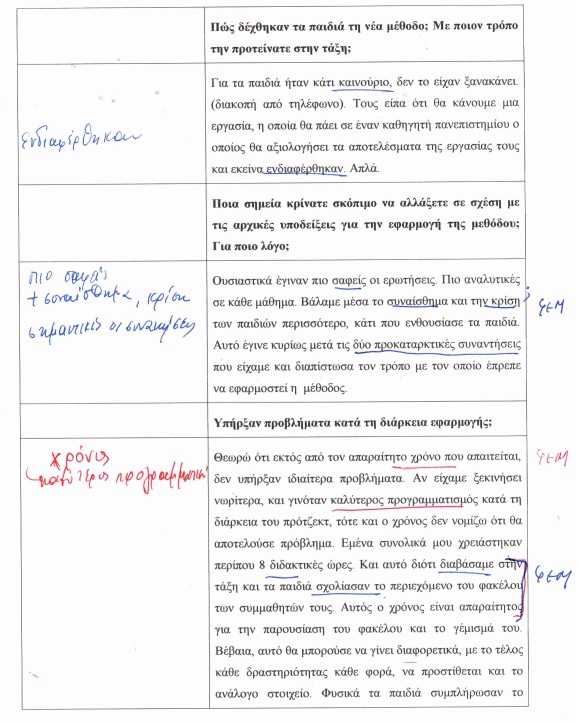
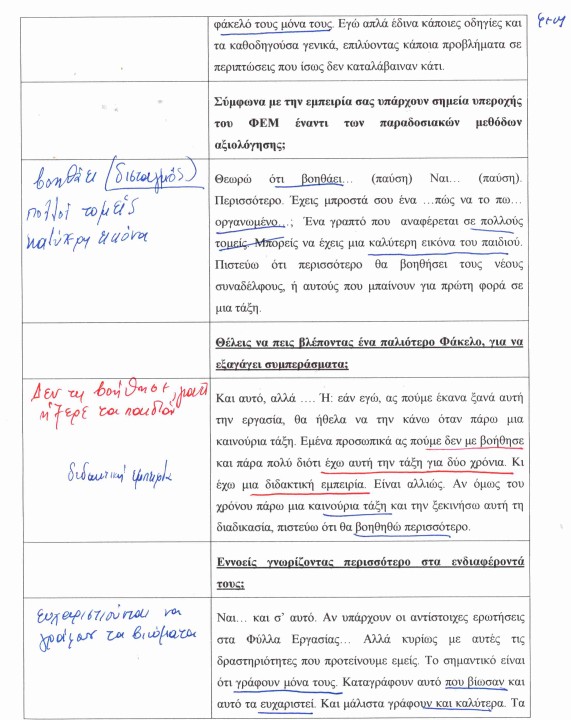
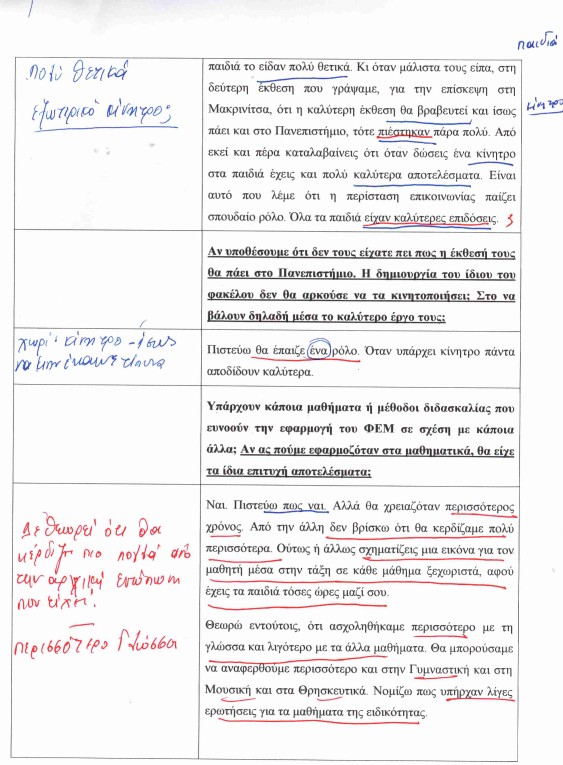
4η ΣΥΝΕΝΤΕΥΞΗ
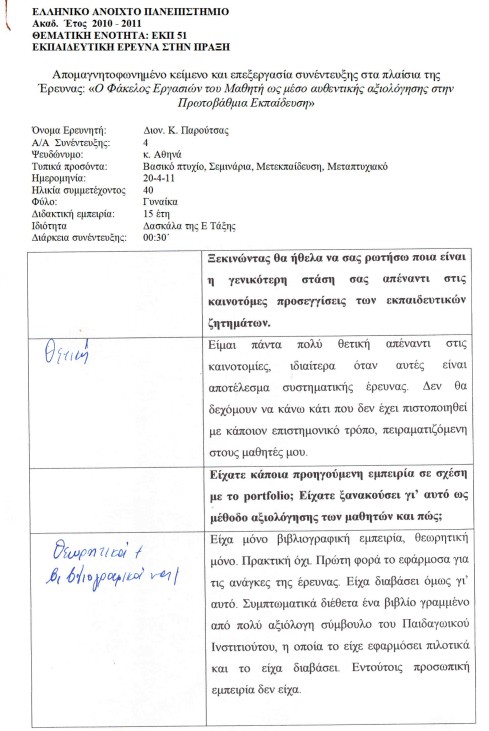
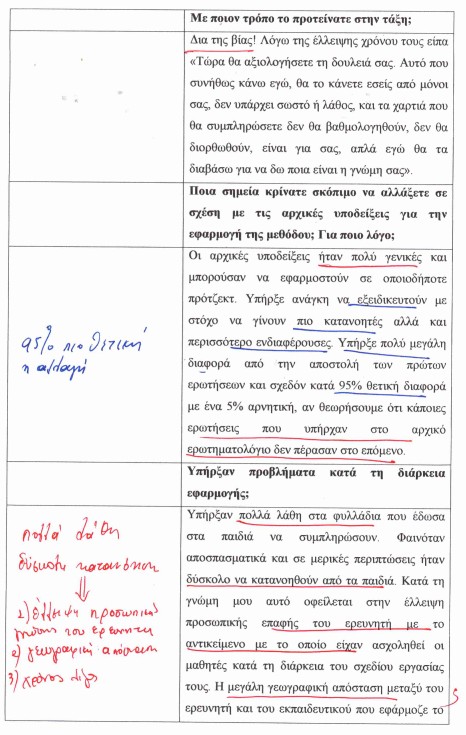
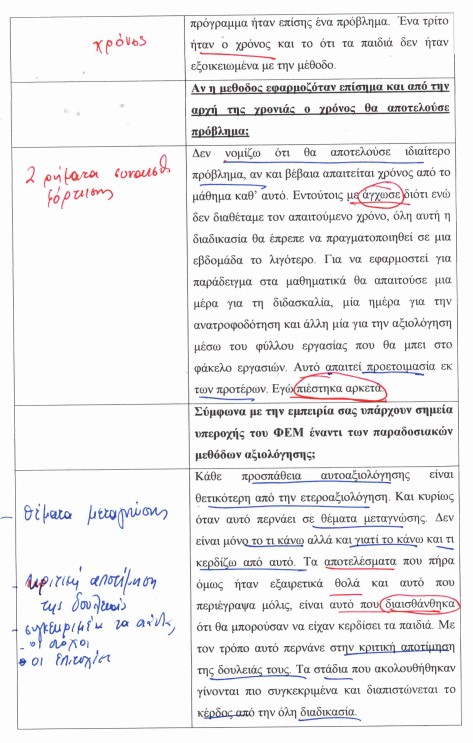
Διασταύρωση Ερευνών
ΠΑΡΑΔΕΙΓΜΑ ΑΠΟΔΕΛΤΙΩΣΗΣ ΕΡΕΥΝΩΝ ΣΧΕΤΙΚΑ ΜΕ ΤΗΝ ΑΞΙΟΛΟΓΗΣΗ
|
Ε. Χανιώτη |
Προτείνεται, λοιπόν, οι εκπαιδευτικοί να βάζουν τα παιδιά που τείνουν να χρησιμοποιούν δικές τους στρατηγικές μαζί με εκείνα που δεν χρησιμοποιούν έτσι ώστε ο κάθε μαθητής να εξηγεί τη στρατηγική του και ο ένας να χτίζει πάνω στη σκέψη του άλλου |
|
W. Snow |
Teachers should give further consideration to the discrepancy in beliefs on whether the child should have the option of when to retest in all instances. Furthermore, although average test scores were raised, many of the elevations were not significant. While there are those who feel that raising test scores, no matter how minimal, makes retesting worthy, others argue that the time necessary for preparing retests could be more wisely spent in the classroom. It was not possible to determine which type of student—whether of high, medium, or low ability—benefited most from retesting. |
|
Ν. Ρέλλος |
Προκύπτει, ως επιθυμητός και προτεινόμενος τύπος αξιολόγησης μια μικτή μορφή αυτής, ήτοι βαθμολογική, συνοδευμένη και από περιγραφική αξιολόγηση για τις τέσσερις τελευταίες τάξεις του δημοτικού σχολείου, ενώ για τις δύο πρώτες τάξεις αυτού εκφράζονται οι εκπαιδευτικοί υπέρ της περιγραφικής μόνο. |
|
N. Taha |
Το σχολείο οφείλει:
Το παιδί δεν πρέπει να αντιμετωπίζεται ως παθητικός δέκτης, που καλείται να απομνημονεύσει την τεμαχισμένη γνώση. Το σχολείο οφείλει να παρέχει αυτονομία στο μαθητή και να τον διδάσκει πώς να αντλεί και να επεξεργάζεται πληροφορίες, ώστε ο ίδιος να παράγει νέα γνώση. Από όσα αναφέρθηκαν παραπάνω διαπιστώνει κανείς ότι οι αλλαγές, που χρειάζεται να γίνουν σχετικά με τον τρόπο αξιολόγησης των μαθητών, είναι δομικές και αφορούν σε όλη τη φιλοσοφία του Σχολείου και του Εκπαιδευτικού Συστήματος. Συνεπώς, αν θέλουμε να απαλλάξουμε τους μαθητές από τις αρνητικές επιδράσεις της ψυχικής πίεσης, είναι σημαντικό να εστιάσουμε σε ουσιαστικές αλλαγές, που σχετίζονται με τη δομή του Σχολείου. Είναι βασική, λοιπόν, προϋπόθεση για την μείωση της ψυχικής πίεσης στα παιδιά, να εκλείψουν ή τουλάχιστον να περιοριστούν όλοι αυτοί οι αρνητικοί παράγοντες. Αυτό αποτελεί μέλημα των γονέων, των διδασκόντων και των παραγόντων της πολιτείας, που εμπλέκονται στη μόρφωση των παιδιών και στη μελλοντική τους επαγγελματική αποκατάσταση |
|
Βλάχου |
Οι εναλλακτικές τεχνικές αξιολόγησης:
|
|
Filler & Pollard |
This study and others (eg Torrance and Pryor. 1994) suggest that technical approaches need to be supplemented with sociological understandings if assessment practices are to be used effectively in the support of learning In place of the prevailing view of assessment as a science, we should view it as an art. Studies of the socio-cultural contexts which help shape pupils' assessment goals and responses therefore, not only offer a deeper understanding of what we do now. They are also crucial for the effective Implementation of the more holistic, collaborative and reflexive approaches to assessment and to learning that the future offers. There is plenty of evidence that parents are more sophisticated in their understanding of what is important in education, and potentially more willing partners in learning than their positioning as 'consumers' allows. As we have tried to indicate, with reference to one child's case study data, parents may be more able than teachers to sense emotional issues in teaming, to notice changes in attitudes overtime, and to monitor motivation, interest and commitment in different subjects or areas of skill development. Personal interest, individual attention, deep knowledge and sensitivity are all on the parent's side as a teacher of their child. |


